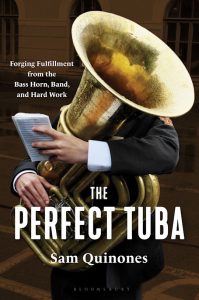Bloomsbury
Review by Brian Tanguay

It’s not often I start a review with, “I loved this book,” but in the case of The Perfect Tuba by Sam Quinones it’s the absolute truth. This story fascinated me from page one and never let up, and by the end I felt uplifted. An award winning author and reporter who wrote narrative nonfiction about crime, drug addiction, and the opioid crisis for many years, Quinones developed a fascination for the tuba and tuba players, and wrote stories for the Los Angeles Times about the tuba’s popularity in Mexican Los Angeles. As he met and interviewed tuba players while working on other projects, Quinones gathered notes, stories and tuba lore. The result is this wonderful book.
Writing for so long about the scourge of addiction left Quinones searching for counterbalances, for pursuits that nurture individuals and communities instead of destroying them. But his search went deeper; he was looking for the antithesis of our modern marketing culture which promises instant fulfillment of our wants and desires, and happiness through buying things. By no means is the tuba an instrument of instant gratification. It demands patience, dedication, and persistence. As many of the tuba players profiled learned, hard work preceded any reward, and if reward arrived it was rarely accompanied by fame or fortune. Almost without exception, however, the self-knowledge gained from learning to play the tuba, the endeavor itself, proved to be lasting and often life-altering.
“The tuba is an optimistic instrument,” Quinones writes. “It brings the band together; it is the community enhancer. Few players choose it.” More often than not, the kid who arrived late for the first day of band class found that the tuba was the last remaining instrument. The tuba isn’t sexy like the trumpet, and it seems to attract outsiders, misfits, and loners drawn to solitary toil. The tuba doesn’t have a long and distinguished history, it was created in 1835, and it took years for visionary players to imbue the instrument with a rambunctious spirit. We meet and get to know many of these people: Arnold Jacobs. Roger Bobo. Harvey Phillips. Anthony Lacen. We also encounter legendary band directors like Al Cortinas and George Trevino, who against tremendous odds built improbably successful music programs in the Rio Grande Valley of Texas, in poor rural school districts, training students as comfortable in Mexico as they were in the US. The stories are inspiring, a stark contrast to our isolating and distracting culture. With the help of dedicated and caring adults, the children of poor, working-class immigrants put their school on the marching band map.
Equally fascinating is the story of the Chicago Yorks, the greatest tubas ever made, manufactured by the long defunct York Band Instrument Company in Grand Rapids, Michigan. The Stradivarius of tubas, two of which are owned by the Chicago Symphony Orchestra. Built in the 1930s, when mastery of craft still mattered, the York tuba set the standard for sound quality and raw power. Over time the fame and mystery of the York tubas acquired mystical status. At least nine other companies have attempted to replicate the two Chicago Yorks, and as Quinones relates, this pair of tubas has undergone what amounts to gynecological examination. Many people have tried to recreate the “gorgeous, mesmerizing York sound.”
Technically speaking, there’s no such thing as a perfect tuba. But perfection isn’t the point of the story Sam Quinones tells so masterfully: purpose is the point. The Perfect Tuba is about what happens when we find something we can devote our creative energy to achieving. The tuba is a metaphor for the journey. Reward comes from striving toward a productive end, toward mastery and self-fulfillment through simple hard work and earnest effort. The lesson isn’t new, it’s just one we have been conditioned to forget.
